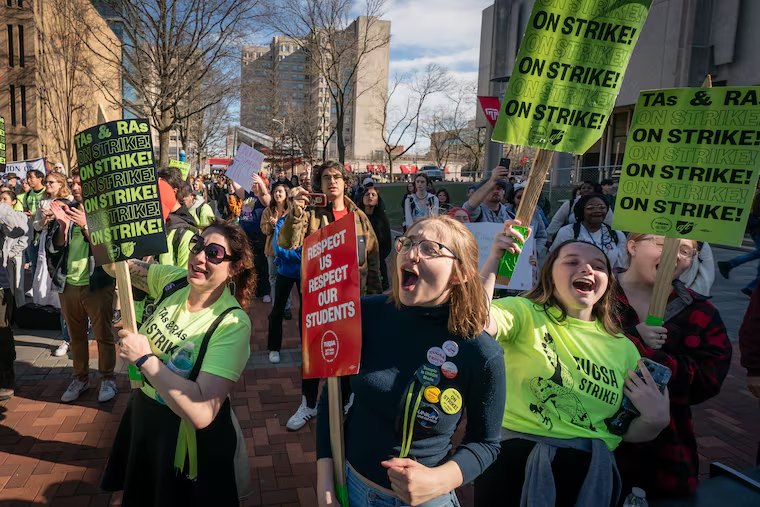Temple reaches another tentative agreement with the striking graduate student union
The deal now has to be placed before the 750-member union for a vote. The union overwhelmingly voted down a tentative agreement reached on Feb. 18. This time, its leadership is backing the agreement.

Temple University once again has reached a tentative agreement with its striking graduate student union.
The deal was struck with the Temple University Graduate Students Association (TUGSA) during meetings this week and accepted by the union’s negotiating team on Thursday, and has to be placed before the 750-member union for a vote beginning Friday. Results are expected Monday.
The union overwhelmingly voted down a tentative agreement reached on Feb. 18.
» READ MORE: Temple grad students overwhelmingly vote down proposed contract, strike continues
But this time, its leadership is backing the agreement. Last time, the negotiating team for TUGSA agreed to put the proposal before members without taking a position.
TUGSA’s negotiating team and executive board “are unanimously endorsing this agreement because it addresses the union’s core demands of increased wages, more affordable dependent health care, reasonable leave policies, and better working conditions,” TUGSA said in a news release late Thursday night.
Ken Kaiser, Temple’s senior vice president and chief operating officer, said under the new agreement the minimum pay for a graduate student would rise to $24,000 in the first year of the contract and to $27,000 by year four. The university has said the most recent average pay for graduate teaching and research assistants —who work part time and teach core undergraduate courses and assist professors with research — was $20,700. That would mean a 30% increase in that salary over the life of the contract, which would run through the academic year 2026.
Individual colleges and schools within Temple can pay more than the minimum, and most do.
Members also will receive a $500 one-time payment, Kaiser said.
The university, too, will begin to pay 25% toward health-care insurance subsidies for graduate students’ dependents. The university already pays the full subsidy for the students.
Students will get up to four consecutive calendar days for paid bereavement leave and up to 21 calendar days for the birth of a child.
Striking graduate students will resume working if the agreement is approved, Kaiser said, but whether and when they will go back to teaching their regular classes is still being worked out. The university had hired replacement instructors for them.
Tuition remission will go back into effect and be retroactive for the semester.
“We are ready to see our graduate students get back to doing what they do best, which is teaching and mentoring our students while also conducting innovative, industry-leading research,” said Deirdre Childress Hopkins, Temple’s senior director of communications. “TUGSA will present the agreement to its membership for ratification today, and we are optimistic that it will be accepted.”
Whether the outcome of the vote will be different remains to be seen.
On Twitter, TUGSA touted a “significant initial bump and raises in subsequent years,” the partial subsidy for health care for dependents and improvement in paid parental and bereavement leave, “including specific allowances for international travel.”
In a statement, TUGSA’s lead negotiator Matt Ford said in a news release: “After six weeks of striking, the strength of our members combined with the support from our political, community, and union allies pushed Temple to finally engage with our core demands. We are happy that Temple has finally recognized the value of its graduate employees and that both teams could come to this agreement.”
Earlier this week, the university said it would continue to pay for striking graduate students’ health-care insurance while negotiations continued. That was a departure from its previous stance, which yielded much criticism for the university.
» READ MORE: Temple reports progress in negotiations with striking grad students and plans to meet again Wednesday
Striking students faced a deadline Thursday to pay tuition or face a $100 late fee and the inability to register for more classes.
The union was in its sixth week of a strike, the first in TUGSA’s approximately 20-year history.
Temple’s faculty union earlier this week announced it would hold a vote March 17 on whether to have a vote of no confidence in central administration. If that vote passes, the no confidence vote would be held the following week.
» READ MORE: How does Temple grad students’ pay compare to other schools?
The university’s handling of the TUGSA strike is one of the reasons the faculty members are voting. If the tentative agreement is approved by then, it’s uncertain what impact that could have on the vote.
Before the tentative agreement was struck, the university had been offering a 10% raise retroactive to Feb. 1 and another 5% in August, in addition to a $1,000 one-time payment, small increases in subsequent years, tuition remission and free health-care insurance for the students, but nothing for their dependents.
The union had been seeking a 50% increase in pay, which it said was a necessary cost-of-living adjustment. If granted, it would have increased base pay to more than $32,000.
The university has contended that only 30% of graduate students have been striking.
There have been increasing calls for better pay for graduate students nationally and strikes at several other colleges, most recently the University of California. The University of Pennsylvania last semester passed a nearly 25% increase in its minimum pay for doctoral students — the largest one-time boost in the school’s history. Starting in 2023-24, the minimum stipend will rise from $30,547 to $38,000.
Some of Temple’s peer colleges pay graduate students more. At Pennsylvania State University, graduate assistants with 20-hour-a-week appointments, 36 weeks a year, earn an average of $24,822 annually.
Staff writer Lizzy McLellan Ravitch contributed to this article.